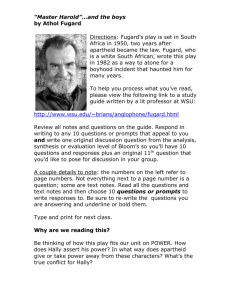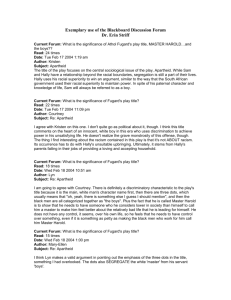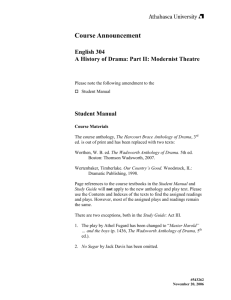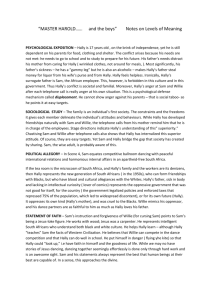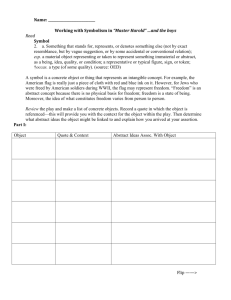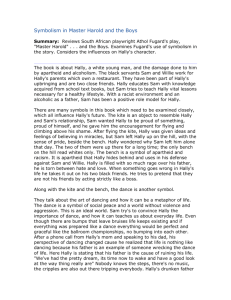"Master Harold" . . . and the Boys Samira Sasani
advertisement
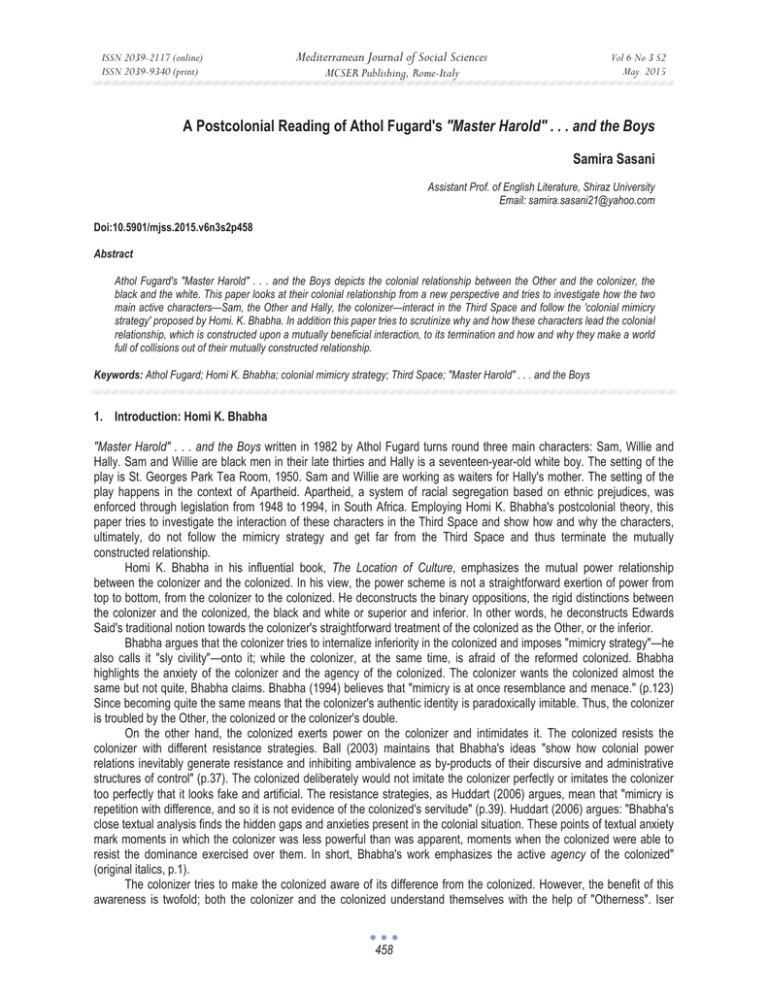
ISSN 2039-2117 (online) ISSN 2039-9340 (print) Mediterranean Journal of Social Sciences Vol 6 No 3 S2 May 2015 MCSER Publishing, Rome-Italy A Postcolonial Reading of Athol Fugard's "Master Harold" . . . and the Boys Samira Sasani Assistant Prof. of English Literature, Shiraz University Email: samira.sasani21@yahoo.com Doi:10.5901/mjss.2015.v6n3s2p458 Abstract Athol Fugard's "Master Harold" . . . and the Boys depicts the colonial relationship between the Other and the colonizer, the black and the white. This paper looks at their colonial relationship from a new perspective and tries to investigate how the two main active characters—Sam, the Other and Hally, the colonizer—interact in the Third Space and follow the 'colonial mimicry strategy' proposed by Homi. K. Bhabha. In addition this paper tries to scrutinize why and how these characters lead the colonial relationship, which is constructed upon a mutually beneficial interaction, to its termination and how and why they make a world full of collisions out of their mutually constructed relationship. Keywords: Athol Fugard; Homi K. Bhabha; colonial mimicry strategy; Third Space; "Master Harold" . . . and the Boys 1. Introduction: Homi K. Bhabha "Master Harold" . . . and the Boys written in 1982 by Athol Fugard turns round three main characters: Sam, Willie and Hally. Sam and Willie are black men in their late thirties and Hally is a seventeen-year-old white boy. The setting of the play is St. Georges Park Tea Room, 1950. Sam and Willie are working as waiters for Hally's mother. The setting of the play happens in the context of Apartheid. Apartheid, a system of racial segregation based on ethnic prejudices, was enforced through legislation from 1948 to 1994, in South Africa. Employing Homi K. Bhabha's postcolonial theory, this paper tries to investigate the interaction of these characters in the Third Space and show how and why the characters, ultimately, do not follow the mimicry strategy and get far from the Third Space and thus terminate the mutually constructed relationship. Homi K. Bhabha in his influential book, The Location of Culture, emphasizes the mutual power relationship between the colonizer and the colonized. In his view, the power scheme is not a straightforward exertion of power from top to bottom, from the colonizer to the colonized. He deconstructs the binary oppositions, the rigid distinctions between the colonizer and the colonized, the black and white or superior and inferior. In other words, he deconstructs Edwards Said's traditional notion towards the colonizer's straightforward treatment of the colonized as the Other, or the inferior. Bhabha argues that the colonizer tries to internalize inferiority in the colonized and imposes "mimicry strategy"—he also calls it "sly civility"—onto it; while the colonizer, at the same time, is afraid of the reformed colonized. Bhabha highlights the anxiety of the colonizer and the agency of the colonized. The colonizer wants the colonized almost the same but not quite, Bhabha claims. Bhabha (1994) believes that "mimicry is at once resemblance and menace." (p.123) Since becoming quite the same means that the colonizer's authentic identity is paradoxically imitable. Thus, the colonizer is troubled by the Other, the colonized or the colonizer's double. On the other hand, the colonized exerts power on the colonizer and intimidates it. The colonized resists the colonizer with different resistance strategies. Ball (2003) maintains that Bhabha's ideas "show how colonial power relations inevitably generate resistance and inhibiting ambivalence as by-products of their discursive and administrative structures of control" (p.37). The colonized deliberately would not imitate the colonizer perfectly or imitates the colonizer too perfectly that it looks fake and artificial. The resistance strategies, as Huddart (2006) argues, mean that "mimicry is repetition with difference, and so it is not evidence of the colonized's servitude" (p.39). Huddart (2006) argues: "Bhabha's close textual analysis finds the hidden gaps and anxieties present in the colonial situation. These points of textual anxiety mark moments in which the colonizer was less powerful than was apparent, moments when the colonized were able to resist the dominance exercised over them. In short, Bhabha's work emphasizes the active agency of the colonized" (original italics, p.1). The colonizer tries to make the colonized aware of its difference from the colonized. However, the benefit of this awareness is twofold; both the colonizer and the colonized understand themselves with the help of "Otherness". Iser 458 ISSN 2039-2117 (online) ISSN 2039-9340 (print) Mediterranean Journal of Social Sciences MCSER Publishing, Rome-Italy Vol 6 No 3 S2 May 2015 (2007) stipulates: "Otherness turns into a mirror for self-observation, and such a relationship sets the process of selfunderstanding in motion, because the alien that is to be grasped realizes itself to the extent to which one’s own dispositions come under scrutiny. The knowledge thus obtained is twofold: by getting to know what is different, one begins to know oneself" (p.36). Habib (2008) also notes that Hegel believes difference to be indispensable to the notion of identity (p.387). Hegel believes that, “identity has its nature beyond itself, in difference . . . . identity and difference are inseparable” (Habib 2008, p.388). Based on Homi K. Bhabah's theory, the identities of the colonizer and the colonized are formed in the Third Space. Bhabha perceives it as: "the encounter of two social groups with different cultural traditions and potentials of power as a special kind of negotiation or translation," which "takes place in a Third Space of enunciation." (Ikas and Wagner 2009, p.2) Based on "The Third Space" theory of Bhabha, "minority groups in the metropoles—marginals within the center—adumbrate a third rhetorical space that disrupts and destabilizes centralized authority." (Huggan 2001, p.21) 2. The Characters Follow the 'Colonial Mimicry Strategy' in the Third Space The play starts while Sam is instructing Willie how to dance Foxtrot. Sam is a much more accomplished dancer than Willie. Willie is not that much talented in dancing and thus he is teased by Sam. Willie is practicing without his partner, Hilda—his mistress—since he has beaten her so much that she does not come to practice with him anymore. Therefore, very ridiculously Willie is practicing with a pillow, which is the cause of derision for Sam. Having a taste of humor, Sam ludicrously justifies Willie's shortcoming in dancing by ascribing "leg trouble" to him. When Hally enters the tearoom, Sam informs him that his mother is out and that she goes to the hospital to fetch Hally's father home. The news is not good since Hally hates his alcoholic father. Hally abhors whatever related to his father, such as the comic books—Mr. Kempston brings them for his father—which Hally calls: "rubbish! Mental pollution" (Fugard 1982, p.13). The relationship between Hally, Sam and Willie is a colonial relationship in which Hally is the colonizer and Sam and Willie are the Others. As Bhabha maintains, the colonizer, Hally tries to make the Other almost the same but not quite the same. The relationship between Hally and the black boys is not a one way relationship in which the colonizer is the absolute power and looks at the Other from the top position. Following the desired mimicry strategy, both the colonizer and the Other try to get close to the viewpoint of the other party. Thus the colonial relationship between Hally and the black men is not a traditionally straightforward relationship from top to bottom. They treat one another friendly and in this mutual relationship they try to benefit from the relationship they are in. Being in the Third Space, no party has priority over the other. In this kind of colonial relationship both the colonizer and the Other have power over the other party. Thus the colonizer is not only intimidating the Other but it is also intimidated by the Other. The black men try to get close to Hally and look at the world from his point of view. They do their best to assimilate themselves with Hally, the colonizer. Both Sam and Willie can well get along with Hally. Helping Hally with his high school courses and thus encountering philosophical or ideological discussions, Sam tries not to get distance from Hally though his view is different. Sam, who has more active presence in the play than Willie, does his best to assimilate himself with Hally, on one hand, and on the other hand, he does not want to be quite the same as the colonizer, Hally, which can be interpreted as the emblem of his resistance to servitude. Sam, the Other, is tired of the injustice and racial segregation committed against the black people, the Other by the Apartheid regime. He, at the begging of the play, has a pessimistic look at life, while Hally ensures him that one day a reformer, a messiah will come and change the world. Hally, the colonizer, tries to lessen Sam's anger by ensuring him that one day, a "Social Reformer" will change the deplorable situation. In other words, Hally, tries to get close to Sam and looks at the world from the Other's viewpoint, from the Third Space: Hally: It doesn't have to be that way. There is something called progress, you know. We don't exactly burn people at the stake anymore. Sam: Like Joan of Arc. Hally: Correct. If she was captured today she'd be given a fair trial. Sam: And then the death sentence. Hally: Correct. If she was captured today she'd be given a fair trial. Sam: and then the death sentence. Hally: (A world-weary sigh) I know, I know! I oscillate (mispronounces) between hope and despair for this world as well, Sam. But things will change, you wait and see. One day somebody is going to get up and give history a kick up the backside and get it going again. (Fugard 1982, p.18) Referring to his History book, Hally believes that every age has its Social Reformer. In this part of the play, they 459 ISSN 2039-2117 (online) ISSN 2039-9340 (print) Mediterranean Journal of Social Sciences MCSER Publishing, Rome-Italy Vol 6 No 3 S2 May 2015 start discussing about the 'men of magnitude' in history, as they call them. This part shows how the colonizer and the Other try to get along. Neither the colonizer nor the colonized has the absolute power and thus justifying their beliefs, each party exerts its power over the other. The Other has the significant role in making the identity of the colonizer, as it is well portrayed in this part of the play. In other words, it is in the presence of the difference, the Other, that the colonizer understands its own identity better. Culler believes: “even the idea of personal identity emerges through the discourse of a culture: the “I” is not something given but comes to exist as that which is addressed by and related to others” (qtd. in Ashcroft et al. 2007, p.206). "In Derrida’s words, what we take to be meaning is really only the mental trace left behind by the play of signifiers. And that trace consists of the differences by which we define a word" (qtd in Tyson 2006, p.253). Therefore, the colonized is shaped by and also shapes the colonizer; it is gazed at and gazes at the colonizer and that is the mutual complex relationship between the colonizer and the Other which Bhabha suggests. For naming the men of magnitude in history, each of them looks at this issue from his own point of view. Sam believes that Napoleon is the man of magnitude since he "regarded all people as equal before the law and wanted them to have equal opportunities for advancement" (Fugard 1982, p.20). Hally, on the other hand, admonishes Sam that he should not confuse historical significance with greatness and then he calls Charles Darwin the man of magnitude. Living in South Africa and in Apartheid regime, Sam the Other, is obsessed with the equality of people, thus he names Napoleon and Hally, the colonizer who is obsessed with taking advantage and with development and progress, names Darwin who proposed the Theory of Evolution and who revolutionized science, as Hally assumes. The second man of magnitude, Sam proposes is Abraham Lincoln; and the third figure is a literary figure, William Shakespeare. Hally, on the other hand, proposes Tolstoy, as Hally says: "he gets the title on two scores: social reform and literary genius" (Fugard 1982, p.22). Sam, as the Other, who tries to be almost like the colonizer does not reject Hally's suggestions and leniently accepts Hally's idea: Hally: Don't get clever, Sam. That man freed his serfs of his own free will. Sam: No argument. He was a somebody alright. I accept him. (Fugard 1982, p.24) The other suggested man of magnitude by Sam is Jesus, the messiah. This time, Hally, who introduces himself as an atheist, changes the subject and suggests: "Don't let's get started on religion" (Fugard 1982, 24). As Bhabha theorizes, the "colonial mimicry strategy" is advocated by both parties, the colonizer and the colonized or generally speaking, by the colonizer and the Other, since both parties disavow being quite the same. Colonial mimicry strategy desires: "a reformed recognizable Other, as a subject of difference that is almost the same, but not quite" (original italics, Huddart 2006, p.40). Hally, very much like Sam does not want to exert his absolute power over the other party or as Huddart believes, he does not want to terminate the colonial relationship by his despotism. Sam, the Other, tries to follow the 'colonial mimicry strategy' and assimilate himself with Hally. Sam tries to become almost the same as Hally, because Hally as a colonizer desires; however Sam resists becoming quite the same which is the sign of his resistance to servitude. Sam states: "I've got one I know we'll agree on. A simple straight-forward great Man of Magnitude . . . and no arguments. And he really did benefit all mankind" (Fugard 1982, p.25). Sam proposes Alexander Flemming. Hearing the name of Alexander Flemming excites Hally: "Splendid Sam! Splendid. For once we are in total agreement. The major breakthrough in medical science in the 20th century. If it wasn't for him, we might have lost the Second World War" (Fugard 1982, p.26). Hally looks at Flemming from political point of view and the services he had done to soldiers during the Second World War. Sam, once again, tries to find a common ground to become almost the same as Hally; Hally also becomes happy when he sees the reformed but recognizable Other. Hally happily says: "It's deeply gratifying, Sam, to know that I haven't been wasting my time in talking to you. (strutting around proudly) Tolstoy may have educated his peasants, but I've educated you" (my emphasis, Fugard 1982, p.26). Finding Sam almost the same, Hally satisfactorily acclaims Sam. Hally, the colonizer, has educated the Other to make out of it a reformed but recognizable Other and he has been successful, as he claims. Thus, the 'colonial mimicry strategy' proposed by Homi K. Bhabha, is a strategy advocated by both parties, the colonizer and the colonized or the Other. The colonizer desires to make the colonized almost the same but not quite the same because if the Other becomes quite the same it tacitly means that the authentic identity of the colonizer is imitable and it is in contrast with what the colonizer desires. As Bhabha maintains: "colonial discourse wants the colonized to be extremely like the colonizer, but by no means identical" (Huddart 2006, p.40). On the other hand, the colonized or the Other wants to be almost the same as the colonizer but it does not want to be quite the same to resist his loss of identity which is the emblem of its resistance to sheer servitude. As Bhabha (1994) argues, in The Location of Culture, "the 460 ISSN 2039-2117 (online) ISSN 2039-9340 (print) Mediterranean Journal of Social Sciences MCSER Publishing, Rome-Italy Vol 6 No 3 S2 May 2015 discourse of mimicry is constructed around an ambivalence; in order to be effective, mimicry must continually produce its slippage, its excess, its difference" (p.122). The colonizer, on the other hand, is intimidated by the Other who may become the colonizer's 'colonial doubl with the same power. The colonizer is intimidating the Other and at the same time it is intimidated by the Other. So, in the Third Space, the identities of the colonizer and the Other are mutually constructed. Very much like Bernard Shaw's Pygmalion in which Elizabeth, the Other, is instructed by Higgins, the colonizer, Sam is educated by Hally to become almost the same. Hally educates Sam to make a reformed but recognizable Other out of Sam. In other words, though Sam is older than Hally he gets lessons from him to become more civilized, from Hally's point of view. Wedeen (2013) sarcastically states that in "colonial and modernization discourses people have to move up the evolutionary ladder and become more 'civilized' before they can be free" (869). Very much like, Elizabeth, Sam repeats the sentences Hally tells him: "repeat after me, Sam: gold in the Transvaal, mealies in the Free State, sugar in Natal and grapes in the Cape" (Fugard 1982, p.26). Even for passing the exams Hally tries to be better than Sam; actually he does not want the Other quite the same. He wants to be better than the Other to show his unreachably authentic identity. However, Hally does not establish a one way colonial relationship with Sam, in which he solely manipulates the relationship and he exerts his absolute power over Sam. Hally educates Sam, though this very action is menacing for the colonizer. Bothe the colonizer and the Other benefit and are benefited from the colonial relationship they are tangled in, as Bhabha stipulates. Sam, Willie and Hally remember the old sweet days when Hally was a little boy and was playing with Willie and Sam. They remember the time when they had very close relationships and were intimate friends. The colonial relationship between Hally and the black men is metaphorically very much like the chess game Hally the little boy played with Sam and Willie years ago when Sam and Willie were teenagers. Hally remembers the days when he and Sam were intentionally colluding to make Willie, who was very weak in playing chess, win the game. The strategy Hally was using was very much like the colonial mimicry strategy they are employing. Hally, with the help of Sam, were letting Willie to win the game. Hally was letting Willie to feel that he is almost the same as Sam and Hally. This way the game was continuing; otherwise, without Willie, the Other in the chess game, the game would be terminated. It is worth mentioning their chess playing since it tangibly portrays the way these characters are employing the mimicry strategy for the sake of the continuation of the mutually beneficial colonial relationship: Willie: You and Sam cheated. Hally: I never saw Sam cheat, and mine were mostly the mistakes of youth. Willie: Then how is it you two was always winning? Hally: Have you ever considered the possibility, Willie, that it is because we were better than you? Willie: Everytime better? Hally: Not every time. There were occasions when we deliberately let you win a game so that you would stop sulking and go on playing with us. Sam used to wink at me when you weren't looking to show me it was time to let you win. Willie: So then you two didn't play fair. Hally: It was for your benefit Mr. Malopo, which is more than being fair. It was an act of self-sacrifice. . . . (My italics, Fugard 1982, pp.30-31) Hally remembers a day when Sam made a kite for him. Hally could not believe that a black man, the Other, knows how to make and fly a kite: "what the hell does a black man know about flying a kite?" (Fugard 1982, p.32). Very much like the chess game, flying the kite is another example portraying the colonial relationship between the colonizer and the Other. Cooperating in making and flying the kite, Sam and Hally reach to their goal by team working. Very much like making and flying the kite, the colonizer and the Other boost the colonial relationship with cooperation and assimilation. The ambiguous point for Hally at that time was that why Sam did not stay there and why he left Hally. As a white little boy, Hally was ignorant of the social and racial segregation, so the reason of Sam's absence has remained vague for Hally for many years. Hally asks Sam why he left him that day but Sam, the Other, does not want to bold the social and racial segregation especially when he is in good colonial relationship with Hally. Sam does not want to highlights his difference from Hally; Sam, as the Other, desires to be almost the same as Hally, the colonizer. Sam eludes Hally's question when Sam says that he does not remember that day which was "too, long ago" and that he left Hally since "he had work to do" (Fugard 1982, p.33, p.34). However, it seems strange for Hally: "there's a nice little short-story there. 'The Kite-Flyers' But we'd have to find a twist in the ending" (Fugard 1982, p.35). Though Sam does not refer to his difference as a black man and thus the Other, Hally refers to the difference but he is not able to see the world through the eyes of the Other and finds why Sam suddenly disappeared, that day. Though Hally is in the Third Space and is getting close to the black men's 461 ISSN 2039-2117 (online) ISSN 2039-9340 (print) Mediterranean Journal of Social Sciences MCSER Publishing, Rome-Italy Vol 6 No 3 S2 May 2015 viewpoint but he is still the colonizer with different standpoint: Hally: Strange, isn't it? Sam: What? Hally: Me and you. Sam: What's strange about it? Hally: Little white boy in short trousers and a black man, old enough to be his father, flying a kite. It's not every day you see that. Sam: But why strange? Because the one is white and the other black? Hally: I don't know. . . . (Fugard 1982, p.35) The ringing of the phone cuts their conversation. It is Hally's mother who wants to bring Hally's father home. Hating his racist father, Hally starts nagging; he cries out that the principle of this world is perpetual disappointment. Sam tries to calm him down; Sam's question about Hally's homework distracts Hally from the tension. For his homework, Hally should write "five-hundred word describing an annual event of cultural or historical significance" (Fugard 1982, p.38). Hally settles down to his homework and Willie and Sam starts practicing foxtrot. Hearing Sam and Willie's quarrels, Hally, the colonizer, gets angry. As the stage direction reads: "he struts around like a little Hitler, ruler in hand, giving vent to his anger and frustration" (Fugard 1982, p.42). Sam and Willie, the Other, are intimidated by Hally. Seeing Sam and Willie's freedom and power—though they are working as the servants for his mother—Hally assumes that they are becoming his colonial doubles. Therefore he is intimidated and consequently he intimidates them: "but what really makes me bitter is that I allow you chaps a little freedom in here—when business is bad—and what do you do with it? The foxtrot!" (Fugard 1982, p.43). Sam, on the other hand, ensures Hally that their practice of foxtrot does not hurt anybody: "it's a harmless pleasure, Hally. It doesn't hurt anybody" (Fugard 1982, p.43). When Hally gets sure that they are still in the position of the reformed but recognizable Other, he calms down and does not reproach them anymore. Sam does his best to cool him down by ensuring Hally that Willie and he are not Hally's colonial doubles with the same power and identity. Getting sure that Willie and Sam are reformed but still recognizable Others, Hally ignorantly undermines their art of dancing. He reasons that the foxtrot is simple since it does not challenge the intellect. Hally extols the value of his job as a student, since he relates it with intellectual activity and on the other hand, he belittles the value of what the Other is practicing. Sam tries his best to make Hally close to the Other's world. Sam asks Hally to try it, to dance. He wants to prove to Hally that it is not as easy as he thinks. Sam asks Hally to take ballroom dancing serious. At the begging of the play, Sam assimilates himself with Hally by finding a common ground for their discussions about the men of magnitude and this time it is Hally's turn to assimilate himself with Willie and Sam, the Other. In Huddart's sense, it is the time that "the colonized returns the colonizer's gaze" (2006, p.45). Now it is Hally's turn to learn from Sam, the Other. The mutual relationship between Hally and Sam is nicely depicted in this part of the play. Hally's sigh of defeat indicates that Hally is not the absolute power in this colonial relationship. Fanon (2008) asserts that: Man is human only to the extent to which he tries to impose his existence on another man in order to be recognized by him. As long as he has not been effectively recognized by the other, that other will remain the theme of his actions. It is on that other being, on recognition by that other being, that his own human worth and reality depend. It is that other being in whom the meaning of his life is condensed. (pp.168-169) It is not only Hally, the colonizer, who manipulates the relationship but it is also manipulated by Sam and Willie, the Others. Hally, with sigh of defeat as the stage direction reads, states: ""Oh well, so much for trying to give you a decent education. I've obviously achieved nothing" (Fugard 1982, p.43). Hally, first, resists to admiring the Other's favorite activity—though it is not an authentic cultural heritage—of foxtrot but then being in need of a subject to do his homework, Hally finds it beneficial to get closer to the Other and looks at Foxtrot from the Other's point of view. Hally, the colonizer, does not regard the Foxtrot and the very competition as an annual event of cultural or historical significance but Sam tries to convince him friendly: "you still haven't told me what's wrong with admiring something that's beautiful and then trying to do it yourself" (Fugard 1982, p.43). From Hally's viewpoint dancing is entertainment but from Sam's viewpoint it is art. Hally does not admit the Foxtrot intellectually; he admits it emotionally; but when Sam tells him that the competitors come from Kingwilliamstown, East London and Port Alfered, Hally surprisingly confesses that he admits it intellectually. He calls the Ballroom Championships a cultural event and wants to write about it as his homework. Hally tells Sam that though his English teacher does not like natives, he can defend dancing and singing as part of the black society: "but I'll point out to him that in strict anthropological term, the culture of primitive black society includes its dancing and singing" (my italics, Fugard 1982,p.47). 462 ISSN 2039-2117 (online) ISSN 2039-9340 (print) Mediterranean Journal of Social Sciences MCSER Publishing, Rome-Italy Vol 6 No 3 S2 May 2015 Hally, the colonizer, being in the Third Space, tries to assimilate himself with the black people and their cultural heritage; though he is still calling the Foxtrot and Ballroom Champions the release of primitive emotions, he does not disavow it. Hally and Sam know how to get along with each other and how to assimilate themselves with the standards of the other group. Both Hally and Sam are aware of the rules of the colonial relationship and it is the cause of the continuation of the relationship. Sam and Willie, the Other, try to assimilate themselves but they do not want to become quite the same. Based on the Other's resistance strategy proposed by Bhabha, the Other does not want to become quite the same and Hally, as the colonizer, also assimilates with the black people to get to his benefits. He wants a reformed but recognizable Other and he does his best to get to this goal for the sake of its benefits. If Hally understands that the Other is getting quite the same, he resorts to his power and furiously exerts his absolute power over the Other and consequently he makes a one way colonial relationship which is surely terminated. As Huddart (2006) maintains: "when the relationship between self and other seems to be one of domination, the fact that there is a relationship at all suggest that domination is not total" (p.46). Sam starts explaining all the details of the Ballroom Champions to Hally very meticulously and Hally writes them as part of his English assignment. Completely engaged in Sam's description of the Champion, Hally asks Sam a question which makes Sam laugh since it shows that Hally is completely unaware of the norms and codes ruling the Ballroom Champion. Hally asks: "when you are dancing—if you and your partner collide into another couple" (Fugard 1982, p.50). Sam—very much like the beginning of the play when Hally teaches Sam the principles of choosing the men of magnitude—teaches Hally the principles ruling the dance of Foxtrot. Sam compares the very dance to life and the way the blacks and the whites live with one another without collusion, if they follow the colonial rules of the Third Space. In other words, metaphorically, Sam very nicely depicts the Third Space they are living in. Sam metaphorically refers to the life of the colonizer with the Other in the Third Space without collusion. He nicely depicts the way all of them, the whites and the blacks, are living with one another. He teaches Hally how this kind of dance is similar to their colonial relationship. Sam, in response to Hally's question, explains to him: That's what I've been trying to say to you all afternoon. And it's beautiful because that is what we want life to be like. But instead, like you said, Hally, we're bumping into each other all the time. Look at the three of us this afternoon: I've bumped into Willie, the two of us have bumped into you, you've bumped into your mother, she bumping into your dad . . . The whole world is doing it all the time. . . . America has bumped into Russia, England is bumping into India, richman bumps into poor man. Those are big collusions, Hally. . . . Are we never going to get it right? . . . learn to dance life like champions instead of always being just a bunch of beginners at it? (Fugard 1982, p.50). Sam names Mahatma Ghandi as a great man who has reached his goals relying on his dreams: "without the dream we won't know what we're going for" (Fugard 1982, p.51). Hally, the colonizer confirms Sam's sayings about Ghandi; in other words Hally, the colonizer, tries to look at the world from the Other's viewpoint. From the Third Space, Hally better understands Sam and Willie, or generally speaking the Other. Learning from the Other, Hally stipulates: Hally: You are right He [Ghandi] certainly was trying to teach people to get the steps right. Sam: And the pope. Hally: Yes, he's another one. . . . He's also out there dancing. You know, Sam, when you come to think of it, that's what the United Nations boils down to . . . a dancing school for politicians! Sam: And let's hope they learn. Hally: . . . So what have we got? Yes, our title: "A World without Collisions". Sam: That sounds good! A world without collisions Hally: Sub-title: Global politics on the dance floor. No. A bit too heavy, hey. What about: Ballroom dancing as a political vision. (Fugard 1982, p.51, p.52) The relationship between the colonizer and the Other, between the whites and the blacks, between art and politics, can be very similar to a world without collision if these people follow the rules of the interaction, otherwise collisions terminate the relationship. The colonial Third Space Bhabha portrays for the colonizer and the Other, is very similar to the world without collision, or as Hally names it, it becomes like "a global politics on the dance floor" (Fugard 1982, p.52). They are immersed in talking that Hally's mother telephones and makes Harry anxious by telling him that his father is getting released from the hospital. Hally cannot tolerate the indecent behavior of his drunk racist father. Hally is tired of fighting and the inconvenience his father makes for him and his mother. Getting angry of hearing this news, Hally goes to his table and tears up the page he was writing on and says: "so much for a bloody world without collisions" (Fugard 1982, p.55). Hally tries to hide his feeling but he cannot. He insults his drunk, crippled father; Sam and Willie try to calm him down; Sam says: "take back those words and ask forgiveness! It's a terrible sin for a son to mock his father with jokes like 463 ISSN 2039-2117 (online) ISSN 2039-9340 (print) Mediterranean Journal of Social Sciences MCSER Publishing, Rome-Italy Vol 6 No 3 S2 May 2015 that. You'll be punished if you carry on. Your father is your father, even if he is a . . . cripple man" (Fugard 1982, p.57). 2.1 The Colonial Relationship Is Terminated As Sam, the Other, intervenes, Hally cannot tolerate it and interpret Sam's intervention as the sign of the Other who is becoming quite the same to the extent that it is not recognizable anymore. Huddart (2006) maintains that, "colonial authority is menaced by the colonized to the extent that it utterly depends on the colonized for its sense of itself" (p.61). Thus finding Sam as his colonial double who has the same power, Hally admonishes Sam: "It's your turn to be careful, Sam. Very careful! You're treading on dangerous ground. Leave me and my father alone" (Fugard 1982, p.57). Huddart (2006) well represents this ambivalent situation: "the play between equivalence and excess makes the colonized both reassuringly similar and also terrifying." (p.41) Hally is intimidated so much that he cannot tolerate the Other anymore and resorts to the traditional straightforward exertion of power which drastically leads to failure and also to the termination of the colonial relationship. Hally tells Sam: "My mother is right. She's always warning me about allowing you to get too familiar. Well, this time you've gone too far. It's going to stop right now" (Fugard 1982, p.58). Hally reminds Sam, the Other who is becoming quite the same in Hally's view, that he is only a servant and that his father is Sam's boss. Sam insists that Hally's mother is his master not Hally's father but Hally reminds Sam that since his father is a white man thus he is his boss. However, Roberts (1982) believes; "Hallie is too young and too self-absorbed to understand what is leading him to a moment of collision with Sam and then to bitter rejection of the black man who has been more of a father to him than his own father" (p.30). But Hally, the colonizer, is highly intimidated by the Other and thus he reacts this way. Seeing Sam's power especially when Sam intervenes and advises Hally how to behave his father, Hally is very much intimidated and thus decides to terminate the threatening colonial relationship. He asks Sam to call him Master Harold and if he does not he will lose his job. He tells Sam that his father very much like his mother asks Hally to treat Willie and Sam as servants: "you must teach the boys to show you more respect, my son" (Fugard 1982, p.60). Hally starts insulting Sam and the black people in general; he spits in Sam's face. As Huddart believes, Hally leads the colonial relationship with Willie and Sam into its termination when he trespasses the rules of the Third Space. He withdraws from the Third Space and does not follow the colonial mimicry strategy, anymore. Sam, seeing Hally's brutality, resolutely resists Hally; Sam ironically calls Hally Master Harold but very authoritatively warns Hally that Hally has hurt himself. "You've just hurt yourself bad", Sam says to Hally. (original italics, Fugard 1982, p.62). Willie, very much like Sam, is very angry with Hally; both Sam and Willie condemns Hally's deed. Sam reminds Hally how he helped him when he was a little boy and ashamed of his father's indecent behavior. Sam tells Hally why he helped him make a kite and why he did not stay there on the bench as it was a white-only bench. Very much like the essentialist Hally, Sam desperately reveals to Hally his true feelings about Hally and his father: "how do I wash off your and your father's filth? . . . I've also failed. A long time ago I promised myself I was going to try and do something, but you've just shown me . . . Master Harold . . . that I've failed" (Fugard 1982, p.62). Having revealed thei true emotions—Hally also does reveals his real feelings toward the Other, the black people— towards the colonizer, Hally and Hally's father, Sam and Willie decides not to terminate the relationship and asks Hally to try it again and establish a new colonial relationship in the Third Space with Hally and his family, the colonizer. Metaphorically, Sam refers to flying another kite which means founding a new colonial relationship in which both the colonizer and the Other benefit from in their mutual relationships. Sam believes that it has worked once and it will work again. Hally, in response, does not oppose to him but assumes that the atmosphere is not appropriate. The geographical atmosphere Hally refers to may metaphorically mean the current social atmosphere which is not appropriate for this kind of relationship. But the last conversation between Sam and Hally is hopefully inspiring. On the other hand, Willie also decides to establish a new relationship with Hilda and promises not beat her again. Sam and Willie, at the end of the play, rehearse dancing again which can be a symbol of nonracial society in the future as Jordan (1993) believes: "In its combination of European forms with local township traditions, it is also a figure for the nonracial society of the future that is glimpsed in the play's closing moments" (p.466). 3. Conclusion Therefore, the colonial relationship has continued as long as both the colonizer and the Other presume that the relationship is mutually beneficial. In the beginning of the play, Hally teaches Sam and Sam tries to assimilate himself with Hally, near the end of the play, Sam teaches Hally and thus, being in the Third Space, Hally tries to assimilate with the Other. But as soon as, Hally, the colonizer, assumes that Sam is becoming quite the same, he decides to terminate 464 ISSN 2039-2117 (online) ISSN 2039-9340 (print) Mediterranean Journal of Social Sciences MCSER Publishing, Rome-Italy Vol 6 No 3 S2 May 2015 the colonial relationship in which he may become the loser. In the colonial relationship proposed by Bhabha, none of the parties, neither the colonizer nor the Other, is the loser and none is the winner. Consequently, the colonial mimicry strategy is supported by both parties in this mutual relationship and the identities are also mutually constructed in the presence of the Other. The Other desires to become almost the same as the colonizer but not quite the same which is the emblem of the Other's resistance to servitude and this is the very resistance strategy employed by the Other, and on the other hand, the colonizer desires a reformed but recognizable Other. The colonizer is intimidated by the Other who becomes quite the same and who gains the equal power and thus becomes its colonial double. As long as they follow the colonial rules of the Third Space, the world they are living in is the world without collisions but as soon as a party understands that it is defeated by the other party, brutal hostility and consequently fighting begins and thus as Huddart says the colonial relationship is lead into its termination. At the end of the play when the mutual relationship has been completely broken, Sam's suggestion inspires hope for the establishment of the new colonial relationship, the one very similar to the previous one but this time the stronger relationship than the previous one they may found since they have experienced the futility of the colonial relationship in which one party has the absolute power over the other. Huddart articulates: "colonialism is marked by a complex economy of identity in which colonized and colonizer depend on each other" (2006, 2). The Other is not something outside or beyond the self, as the traditional Cartesian perspective would have it; rather, it is deeply implicated in and with the self (Türkkan 2011, p.369). The characters have understood that entering the Third Space will be beneficial for both parties and in the colonial atmosphere in which there is no way out, the best solution for having a world without collision is following the colonial strategies beneficial for both parties and it is not achieved unless the colonizer and the Other carefully follow the rules and do not trespass them, otherwise the world will be changed to a world full of big collisions. References Ashcroft, B., Griffiths G., & Tiffin H. (2007). Post-Colonial Studies: Key Concepts. (2nd ed.). New York: Routledge. Ball, J. C. (2003) Satire and the Postcolonial Novel. New York: Routledge. Bhabha, H. K. (1994). The Location of Culture. New York: Routledge. Fanon, F. (2008). Black Skin, White Masks. Translated by Charles Lam Markmann. London: Pluto Press. Fugard, A. (1982). "Master Harold". . . and the Boys. New York: Samuel French. Habib, M. A. R. (2008). A History of Literary Criticism and Theory: Form Plato to Present. Malden, MA: Blackwell. Huddart, D. (2006). Homi K. Bhabha. New York: Routledge. Huggan, G. (2001). The Postcolonial Exotic: Marketing the Margins. New York: Routledge. Ikas, K., & Wagner, G. (2009). Introduction. In K. Ikas and G. Wagner (Eds.), Communication in the Third Space. (pp. 1-7). New York: Routledge. Iser, W. (2007). How to Do to Theory. Singapore: Blackwell. Jordan, J. O. (1993). Life in the Theatre: Autobiography, Politics, and Romance in 'Master Harold'... and the boys. Twentieth Century Literature, 39(4), 461-472. Roberts, Sh. (1982). 'No Lessons Learnt': Reading the Texts of Fugard's Lesson from Aoles and 'Master Harold' . . . and the Boys. English in Africa, 9(2), 27-33. Türkkan, S. (2011). Other/Alterity. In G. Castl (ed.), The Encyclopedia of Literary and Cultural Theory (pp. 369-372). Malden, M.A: WileyBlackwell. Tyson, L. (2006). Critical Theory Today: A User-Friendly Guide. New York: Routledge. Wedeen, L. (2013). Ideology and Humor in Dark Times: Notes from Syria. Critical Inquiry, 39 (4), 841-873. 465

